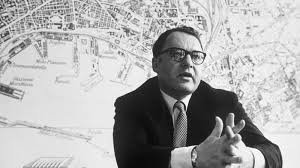THE DEVIL IN THE DETAILS: Francesco Rosi's HANDS OVER THE CITY (co-wri & directed by Francesco Rosi, w/ Rod Steiger, shot by Gianni Di Venanzo, Italy, 100 minutes, 1963)
Francesco Rosi insists on facts and unvarnished reporting. Whatever his politics might be, his north star are FACTS. And this makes his movies demanding.
Actor Rod Steiger is as brilliant and electric as Brando and Hackman. Steiger is one of the greats.
To have Francesco Rosi make a movie with Steiger is almost too exciting to meet expectations.
The movie they made together, HANDS OVER THE CITY, about political corruption and deal making in post war Naples, Italy surpasses expectations.
Shot with impeccable craft by Italian master cinematographer Gianni Di Venanzo (8 1/2, SALVATORE GIULIANO), HANDS OVER THE CITY is all the adjectives you want:
Gritty, journalistic, wry, ironic, brutal, understated, shocking, gripping.
Steiger plays Neopolitan city council member and real estate developer Edoardo Nottola. Nottola's real estate plan will make everyone rich, including the city council members tacitly backing him, as long as the investigations surrounding a building collapse don't mess everything up.
The movie is filled with stunning sequences, just like Rosi's and Venanzo's collaboration SALVATORE GIULIANO. It opens with a jaw dropping sequence of a slum building collapsing. . .right onto the poor and working class community in its shadow.
The editing and camerawork do their job: you get worried there are actual people/extras in the pathway of falling debris.
Because the collapse happens as a result of Nottola's construction projects, the compromised city council has to figure out how to manage the scandal.
A faction of left and center politicians want to investigate. A faction of center and right politicians want the headache to go away.
Nottola, meanwhile, is clearly a man of action-right or wrong. He makes quick decisions, strong arms the rich and political alike. And ultimately makes a stunningly savvy political decision to build a coalition that will elect him building comissioner.
Steiger is just the fox minded raging bull the movie needs. Stressed, frustrated, nervous, scheming, Nottola nevertheless ACTS.
The movie is a feast of brutal visual storytelling. Nottola's penthouse office overlooks all of Naples and is covered with maps, models, designs for his new city.
The movie plays like a condensed precursor version of Robert Caro's great work of non-fiction THE POWER BROKER (1975) about New York's own building czar Robert Moses.
These figures may be anti-heroes. They may be so obsessed with money, ego, power, they don't even register as human the poor and working class people whose lives they tear apart.
And yet. . .they get things done.
This ultimately feels like the point of the movie. It shows how the sausage is made. In the brilliant final act, Nottola commits an act of political heresy to extract a promise in return for delivering a majority.
Everyone involved knows that morals and ethics will have to be left at the door: power and control and winning are everything.
Now, this writer is NOT saying he agrees or signs up to that philosophy. But we can see that those that do, often win. . .and the rest of us suffer because of it.
Rosi is one of those brilliant political moviemakers who knows even if you have political convictions, you have have to make a political movie without an ounce of confirmation bias or dogmatism.
You have to strip the story bare of ideology and cleanse it in truth. And hope that the rage and indignation you hope folks will feel comes out of an acknowledgement that truth was captured on screen.
This movie is an angry movie. But its anger is the cold blue flame not the erratic red flame. By keeping it cool, Rosi gets deeper into the volcano.
Everything is obliterated. The fickle and fence sitters are called out.
What can one do in the face of such devastating reality but...
Face it.
Craig Hammill is the founder.programmer of Secret Movie Club




